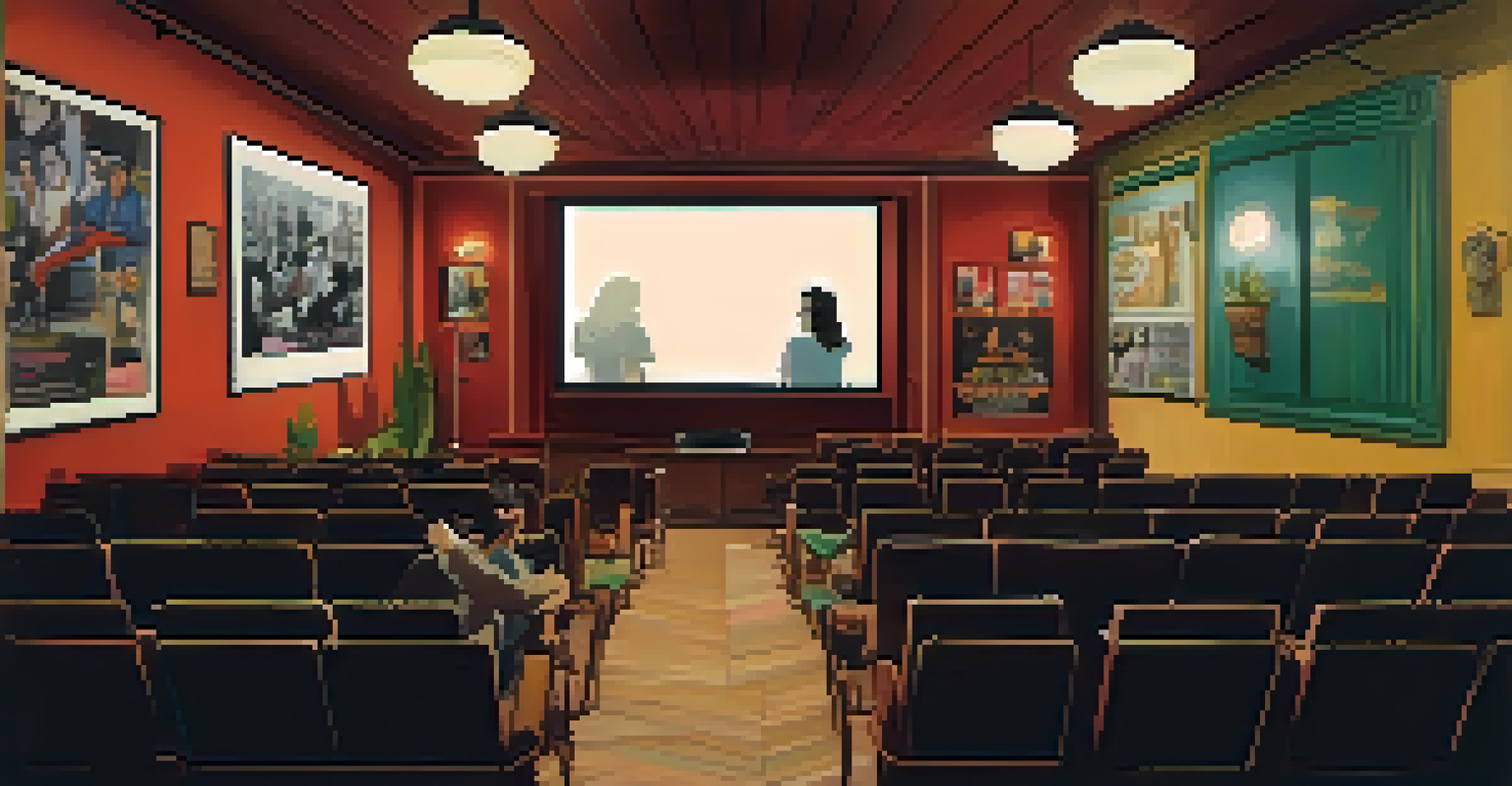The Evolution of Brazilian Cinema: A Cultural Journey

A Brief History of Brazilian Cinema's Beginnings
Brazilian cinema took its first steps in the late 19th century, with short films showcasing the vibrant culture and landscapes of the country. The first film is often credited to the Lumière brothers, whose works captured the imaginations of early audiences. As the 20th century approached, local filmmakers began to emerge, establishing a foundation for what would become a unique cinematic identity.
Cinema is a matter of what's in the frame and what's out of it.
During this period, films often focused on the daily lives of Brazilians, providing a glimpse into the diverse cultures that make up the nation. Early cinema served as a medium for storytelling, reflecting the social and political changes happening in Brazil. As the industry began to grow, so did its ambition, setting the stage for future movements that would reshape Brazilian cinema.
This early era laid the groundwork for a distinct style that combined local themes with innovative techniques, paving the way for future filmmakers. The seeds of creativity were sown, and the journey of Brazilian cinema was just beginning. With each film, the narrative of Brazil was shaped, revealing the complexities of its society.
The Rise of Cinema Novo and Its Impact
In the 1960s, Cinema Novo emerged as a revolutionary movement, aiming to confront social issues and portray the realities of Brazilian life. Directors like Glauber Rocha and Nelson Pereira dos Santos led the charge, using film as a tool for political and social critique. Their works challenged traditional narratives, focusing on the struggles faced by the marginalized and oppressed.

This movement was heavily influenced by the political climate of Brazil, particularly under military dictatorship. Filmmakers used allegory and symbolism to bypass censorship, creating thought-provoking narratives that resonated with audiences. Cinema Novo not only changed the landscape of Brazilian film but also sparked conversations about identity, culture, and resistance.
Brazilian Cinema's Rich Evolution
From its beginnings in the late 19th century to contemporary storytelling, Brazilian cinema has developed a unique identity that reflects the nation's diverse culture.
By blending artistic innovation with social commentary, Cinema Novo positioned Brazilian cinema on the global stage. This era showcased the power of film as a means of expression and highlighted the importance of storytelling in understanding a nation’s history. The legacy of this movement continues to inspire contemporary filmmakers in Brazil and beyond.
The Influence of International Recognition
As Brazilian cinema gained international acclaim, filmmakers began to explore new styles and narratives that resonated with global audiences. The 1990s saw a surge in films that mixed drama, comedy, and social issues, captivating viewers worldwide. This recognition opened doors for Brazilian cinema, allowing it to thrive in a global marketplace.
The power of film is not only in its ability to entertain but also to educate and inspire change.
Films like 'Central Station' (1998) and 'City of God' (2002) showcased the rich tapestry of Brazilian life, drawing attention to both its beauty and its struggles. These films not only received numerous awards but also sparked interest in the diverse stories Brazil had to offer. The success of these productions encouraged a new wave of filmmakers to explore the depths of Brazilian culture.
With international film festivals becoming platforms for Brazilian talent, the narrative of cinema in Brazil transformed. This newfound visibility allowed filmmakers to express their unique perspectives, contributing to a broader understanding of Brazilian identity. The global stage has become a canvas, where the stories of Brazil continue to unfold.
Contemporary Brazilian Cinema: Trends and Themes
Today, Brazilian cinema is characterized by its diversity, with filmmakers exploring a wide range of genres, themes, and styles. From captivating documentaries to gripping dramas, the industry reflects the complexities of modern Brazilian society. Themes of race, class, and gender have emerged as focal points, showcasing the multifaceted nature of life in Brazil.
Many contemporary filmmakers are inspired by the work of their predecessors, yet they infuse their narratives with fresh perspectives. The rise of digital technology has also democratized filmmaking, allowing a new generation of artists to share their stories. Platforms like Netflix have further expanded the reach of Brazilian films, making them accessible to a global audience.
Cinema Novo's Social Impact
The Cinema Novo movement of the 1960s used film as a powerful tool for political and social critique, reshaping narratives around identity and resistance in Brazil.
This era of Brazilian cinema is not just about entertainment; it’s a powerful medium for social change. By addressing pressing issues and highlighting untold stories, filmmakers are fostering conversations that challenge the status quo. As Brazilian cinema continues to evolve, it remains a vital part of the cultural landscape.
The Role of Festivals in Promoting Brazilian Cinema
Film festivals play a crucial role in promoting Brazilian cinema, providing a platform for filmmakers to showcase their work. Events like the Rio de Janeiro International Film Festival and the São Paulo International Film Festival have become essential venues for both established and emerging artists. These festivals not only celebrate Brazilian films but also foster connections within the global film community.
Through these gatherings, filmmakers can engage with audiences, share their experiences, and gain valuable feedback. Festivals often feature panels and discussions, creating opportunities for dialogue about the themes and techniques prevalent in Brazilian cinema. This collaborative environment helps nurture talent and encourages innovation within the industry.
Moreover, film festivals generate excitement around Brazilian cinema, attracting international distributors and investors. This exposure can lead to increased funding and support for future projects, ultimately enriching the cinematic landscape. As a result, festivals continue to be a vital force in the evolution of Brazilian cinema.
Challenges Faced by Brazilian Filmmakers
Despite its successes, Brazilian cinema faces several challenges that impact its growth and sustainability. Economic difficulties, political instability, and funding cuts can hinder filmmakers from realizing their visions. The struggle for resources often forces artists to be creative, but it can also limit the scope of their projects.
Additionally, the competition within the global film market poses a significant challenge. Brazilian filmmakers must navigate a landscape saturated with content from various countries, making it crucial to stand out. This pressure can lead to a focus on commercial success over artistic integrity, causing tension within the industry.
Festivals Boost Brazilian Filmmaking
Film festivals play a vital role in promoting Brazilian cinema by providing platforms for filmmakers to showcase their work and connect with global audiences.
However, many filmmakers are resilient, finding innovative ways to overcome these obstacles. By embracing new technologies and distribution channels, they continue to tell their stories despite the odds. The determination of Brazilian filmmakers is a testament to their passion for cinema and their commitment to sharing their culture with the world.
The Future of Brazilian Cinema: A Cultural Legacy
As we look ahead, the future of Brazilian cinema is filled with promise and potential. With a rich history to draw from, filmmakers are poised to continue exploring the depths of Brazilian culture and identity. The ongoing evolution of technology and media consumption will likely influence storytelling techniques, opening up new avenues for creativity.
Emerging voices are already challenging conventions and pushing boundaries, ensuring that Brazilian cinema remains dynamic and relevant. The global audience's increasing interest in diverse narratives presents an opportunity for Brazilian filmmakers to shine. By sharing authentic stories that resonate with people worldwide, they can contribute to a richer understanding of Brazil.

Ultimately, the future of Brazilian cinema is a celebration of its cultural legacy. As filmmakers continue to push the envelope, they will undoubtedly leave an indelible mark on the world stage. The journey of Brazilian cinema is far from over, and its stories will continue to inspire generations to come.